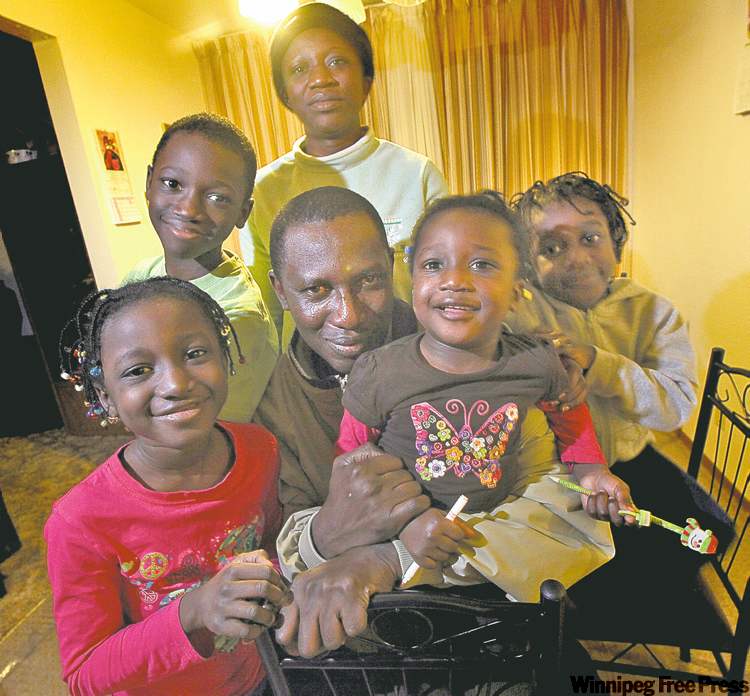Francophone community grows
French-speaking immigrants choose Winnipeg
Advertisement
Read this article for free:
or
Already have an account? Log in here »
To continue reading, please subscribe:
Monthly Digital Subscription
$1 per week for 24 weeks*
- Enjoy unlimited reading on winnipegfreepress.com
- Read the E-Edition, our digital replica newspaper
- Access News Break, our award-winning app
- Play interactive puzzles
*Billed as $4.00 plus GST every four weeks. After 24 weeks, price increases to the regular rate of $19.95 plus GST every four weeks. Offer available to new and qualified returning subscribers only. Cancel any time.
Monthly Digital Subscription
$4.99/week*
- Enjoy unlimited reading on winnipegfreepress.com
- Read the E-Edition, our digital replica newspaper
- Access News Break, our award-winning app
- Play interactive puzzles
*Billed as $19.95 plus GST every four weeks. Cancel any time.
To continue reading, please subscribe:
Add Free Press access to your Brandon Sun subscription for only an additional
$1 for the first 4 weeks*
*Your next subscription payment will increase by $1.00 and you will be charged $16.99 plus GST for four weeks. After four weeks, your payment will increase to $23.99 plus GST every four weeks.
Read unlimited articles for free today:
or
Already have an account? Log in here »
Hey there, time traveller!
This article was published 18/01/2012 (5158 days ago), so information in it may no longer be current.
OTTAWA — Immigration is helping change the face of Manitoba’s francophone community.
Of the French-speaking immigrants in Winnipeg, half are Caucasian, just over one-tenth are Asian and more than 25 per cent are black.
Winnipeg has the highest proportion of black francophone immigrants of any city in the country outside Quebec. Manitoba and Saskatchewan have a higher proportion of blacks among French immigrants than any other region, other than Quebec.

The numbers are growing too, mainly due to a federal strategy to bolster immigration to French-speaking communities outside of Quebec and promote Canada’s bilingual heritage.
In 2006, Ottawa launched the Strategic Plan to Foster Immigration to Francophone Minority Communities. Two years later, it was followed with the Roadmap for Canada’s Linguistic Duality, a $1.1-billion investment across 13 government departments. Immigration from francophone-speaking countries and improved settlement services for those immigrants are among the priorities.
“The roadmap is a plan to really encourage the vitality of francophone communities,” said St. Boniface MP Shelly Glover.
While the strategy isn’t focusing on any one region or country, it is driving up the number of French-speaking immigrants arriving from Africa.
Out of 28 countries in the world where French is the official language, 21 are in Africa. There are another 26 nations where French is present as a language and 11 of those are in Africa.
In 2006, 11,955 immigrants arrived in Canada from French-speaking African countries. In 2008 that jumped to 13,777, and in 2010 jumped again to 15,608.
Since 2006, a total of 1,500 immigrants from primarily French-speaking African nations have settled in Manitoba. With 600 arrivals since 2006, the Democratic Republic of Congo is the No. 1 source country, followed by Egypt (330), Burundi (135), Cameroon (65), Cote d’Ivoire (35) and Mali (25).
Robinson Joseph, his wife and their four children arrived in Winnipeg last July as refugees from Niger. Joseph was from Sudan and had been trying to leave Africa for nearly two decades. Civil wars, extreme violence and uncertain futures had the family seeking a new life.
“We wanted the best for our kids,” he said. “We wanted them to have a different life than we had.”
Joseph settled in Transcona, directed to Winnipeg by the federal government. He had no idea what to expect.
“Everything is good,” he said. “It’s more than I was expecting.”
Although Joseph speaks English quite well, his wife and their children, ages 10, seven, five and two, are all francophones who had little or no English when they arrived. The children are able to attend school in French, which is a bonus, said Joseph. His wife and he are both taking courses to improve their English. He is also looking at training to get a job at Manitoba Hydro.
To support the francophone immigration push, the federal government has added 13 community networks in francophone minority communities to help welcome and integrate immigrants. There have also been promotional tours in western Europe, northwest Africa, Africa and Mauritius promoting provincial nominee programs and encouraging students and other potential immigrants to consider settling in places outside Quebec.
mia.rabson@freepress.mb.ca
Speaking in French
Immigrants from predominantly French-speaking African nations to Manitoba:
2006: 200
2010: 240
— Citizenship and Immigration Canada
African countries with French as the official language (21)
Benin, Burundi, Burkina Faso, Cameroon, Central African Republic, Chad, Comoros, Democratic Republic of Congo, Djibouti, Equatorial Guinea, Gabon, Guinea, Cote d’Ivoire, Madagascar, Mali, Niger, People’s Republic of the Congo, Rwanda, Senegal, Seychelles, Togo.
African countries with French language present (11)
Algeria, Cape Verde, Egypt, Ghana, Guinea-Bissau, Mauritius, Mauritania, Morocco, Sao Tome and Principe, Tunisia, Western Sahara.


